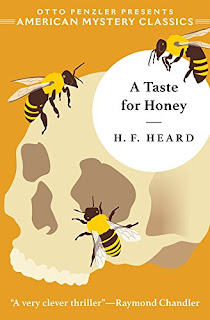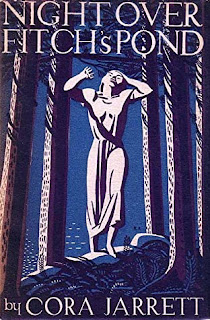9781613161210
Penzler Publishers, American Mystery Classics, 2019
originally published 1941
197 pp
paperback
Still following the séptimo circulo list, up next after Night Over Fitch's Pond comes H.F. Heard's A Taste for Honey (#25), published in 1941 and reprinted in 2019 via Penzler Publishers' American Mystery Classics series. The book was made into a 1966 film called The Deadly Bees, but more on that later.
Last week my insomnia flared up again and I grabbed this book hoping I'd read until drifting off. The complete opposite happened -- once I started it I couldn't stop. It wasn't because it's a great book, but more because what happens here was so far out of the range of most mystery/crime novels of the period and so completely unexpected that I knew there would be no sleep that night. The story is related by Mr. Sydney Silchester, a reclusive sort of fellow who had come to a small village in the countryside for peace and quiet. He lives under a self-made rule of "keeping myself to myself," wanting to be "left alone, at peace," preferring his own company to that of others. Evidently something has happened to shatter his solitude and he feels the need to "set it all down" so that his record (narrated retrospectively), will let people know that he had very little blame in the matter, the whole thing having been "forced" upon him. What follows is not exactly a mystery but a sort of bizarre story that borders on pulpy horror (not the supernatural type but more like a sort of mad-scientist adventure caper), and while there is some detection involved here, this is by no means a whodunit. And it all begins with Silchester's fondness for honey, which he buys regularly from a certain Mr. Heregrove, the local village apiarist. At one point Silchester discovers that he's running low on the stuff, and while considering his next visit to the Heregrove's farm, he learns from his house cleaner that Mrs. Heregrove had met an untimely end after being stung to death by her husband's bees. Though the coroner's inquest arrives at a verdict of accidental death, Heregrove has been ordered to destroy his hives, which leaves Silchester without a supplier. Not keen on asking around the village due to his "dread of business dealings" that might lead to "social entanglements," he finds himself in luck one day while out on a long walk, when he happens upon a sign advertising "a certain amount of honey" for sale. Happy to find a new supplier, he goes on to meet the man who posted it, a certain Mr. Mycroft, who, along with the honey, also provides him with an interesting theory. As the back-cover blurb says, Mr. Mycroft "senses the bloody hand of murder," meaning that he believes that Mrs. Heregrove's death was not an accident at all. That will be it for plot, I'm afraid, because there is no way that I'm going to ruin the show for potential readers.
Despite some testing of my patience with Silchester and Mycroft because of their often lengthy expositions on various topics, I had great fun with this novel. I have to seriously offer a tip of my hat to the author on even coming up with this crazy plot, which had it not been for Mycroft's habit to (and pardon the pun) drone on and on, might have made for better reading. On the other hand, the nature of the villainy revealed here allows for the author to discourse about the limitations of the law which, in this case, leaves these two men no alternative but to handle things themselves. As Mycroft notes,
"The law protects us from the sudden, unpremeditated violence of the untamed blackguard. It is helpless against the calculating malice of a man who patiently and deliberately studies to get around its limitations When you have really faced up to the fact ... that the law, the magistrate and the village policeman are helpless to protect you, then you will be free to consider the unavoidability of step two of doing what we can do."
The situation comes down to a battle of the minds, with uncountable lives at stake if things go wrong.
I should warn potential readers to leave the introduction for last as Otto Penzler reveals "one of the surprises in this book" in his assumption that "the secret has been revealed often enough that few readers will be astounded." I suppose he never thought that perhaps there are still some readers like me who have neither read this book nor discussed it with anyone before, so that's certainly a big oopsie on his part. And as to that secret, well, it's not hard to figure it out pretty much right away with all of the clues offered by the author. Trust me, that's the least concern in this novel. Also, if you are one of those readers who must find something likeable or relatable about the characters, it's very likely you won't find it here. All in all it was a fun read, not perfect by any means, but still very much worth the time.
 |
| movie poster, from filmaffinity |
As to that movie (an Amicus production) I mentioned earlier, the original screenplay was written by Robert Bloch, but the director of the film, Freddie Francis, evidently didn't like it and along with Anthony Marriott, decided to change it. That's a shame really, and according to the B&S About Movies blog, Bloch never saw the film but did say that Deadly Bees "buzzed off into critical oblivion, unwept, unhonoured and unstung." It would probably appeal only to true-blue diehard connoisseurs of old horror films because it was pretty bad, with the plot centering around a pop singer who has gone to Heregrove's farm for a rest after fainting from exhaustion during a television performance. The roles are actually flipped in this film, with Mr. Mycroft (still painfully expository) as the bad guy. I couldn't actually lay hands on a copy to watch but I did find an MST3K (of which I've been a huge fan for eons) episode on youtube which didn't actually quite deaden the pain; even the sarcastic bot banter couldn't save the experience.
 |
| MST3K version, my photo |
I also watched an episode of the Elgin Hour, "Sting of Death" (1955), which stars Boris Karloff and hews much closer to the novel than the later 1966 film. This one is worth the watch, although the scope is rather limited, I suppose, due to the allotted television time. It also won the Edgar Award for best TV episode in a series in 1956.
 |
| Boris Karloff as Mr. Mycroft |
Bottom line: book fun, movie bad; book recommended just because it's so very different and strange, movie is definitely skippable unless you are a masochist.


